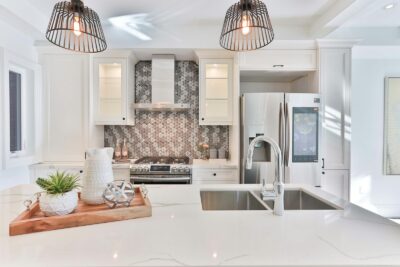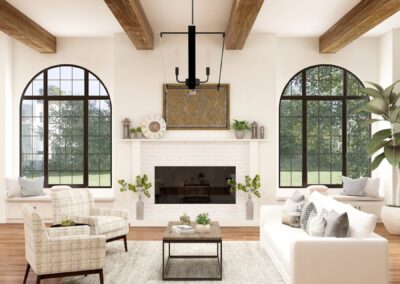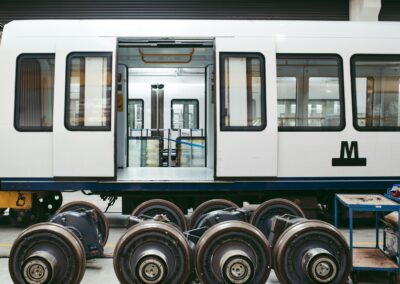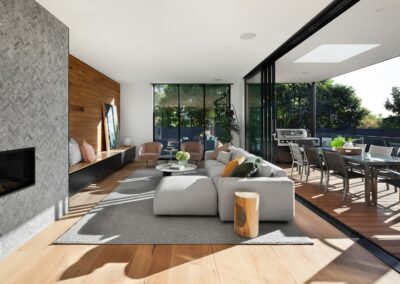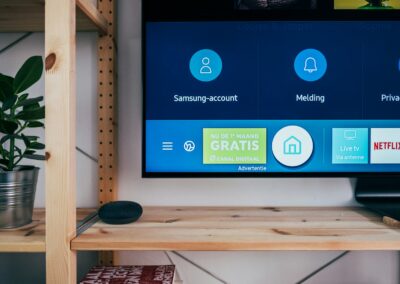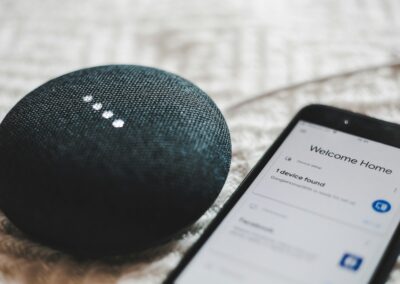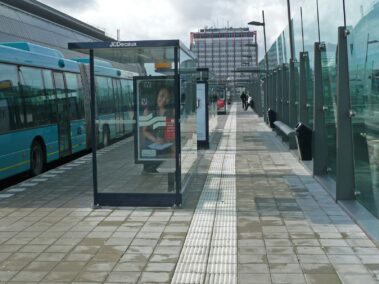Advancements in Smart Home Innovation
Introduction to AI and IoT in Smart Home Design
AI and IoT in smart home design are revolutionizing the way we interact with our living spaces, providing unprecedented levels of convenience, efficiency, and security. The integration of artificial intelligence (AI) and the Internet of Things (IoT) into smart homes is creating a seamless, connected environment that anticipates and responds to the needs of its inhabitants. In regions such as Saudi Arabia and the UAE, this technological evolution is being embraced to enhance urban living standards and support sustainability goals.
In Dubai and Riyadh, the push towards smart city initiatives underscores the importance of advanced technology in urban planning. These cities are leveraging AI and IoT to develop smart homes that not only improve the quality of life for residents but also contribute to broader environmental and economic objectives. This article explores the latest advancements in AI and IoT that are shaping the future of smart home design and innovation.
AI-Driven Personalization and Automation
Intelligent Home Management Systems
One of the most significant advancements in smart home technology is the development of intelligent home management systems. These systems utilize AI to learn the habits and preferences of residents, adjusting lighting, heating, and cooling systems automatically to optimize comfort and energy efficiency. For instance, AI can predict when a resident is likely to return home and ensure that the temperature is set to their preferred level upon arrival. This level of personalization not only enhances convenience but also contributes to energy savings.
In Dubai, the use of intelligent home management systems is part of a broader strategy to create sustainable urban environments. By integrating AI into home automation, Dubai aims to reduce energy consumption and support its sustainability goals. This approach is being mirrored in Riyadh, where smart home technology is a key component of the city’s Vision 2030 initiative.
Voice-Activated Assistants
Voice-activated assistants, powered by AI, have become an integral part of modern smart homes. These devices, such as Amazon’s Alexa and Google Assistant, allow residents to control various aspects of their home environment through simple voice commands. From adjusting the thermostat to turning off the lights, these assistants provide a hands-free, intuitive way to manage home systems.
The adoption of voice-activated assistants is particularly prominent in the UAE, where the emphasis on smart living is driving the integration of advanced technologies into everyday life. These assistants are not only convenient but also enhance accessibility for individuals with disabilities, making smart homes more inclusive.
Predictive Maintenance and Security
AI is also transforming home security and maintenance through predictive analytics. Smart home systems equipped with AI can monitor the condition of appliances and infrastructure, predicting potential failures before they occur. This allows for proactive maintenance, reducing the likelihood of costly repairs and extending the lifespan of home systems.
In terms of security, AI-powered cameras and sensors can detect unusual activity and alert homeowners in real-time. These systems can distinguish between routine movements and potential threats, providing a higher level of security. In Saudi Arabia, the implementation of predictive maintenance and security systems is enhancing the safety and reliability of smart homes, contributing to a higher standard of living.
IoT-Enabled Connectivity and Integration
Seamless Device Integration
The Internet of Things (IoT) is the backbone of smart home connectivity, enabling the seamless integration of various devices and systems. IoT allows appliances, lighting, security systems, and even furniture to communicate and work together, creating a cohesive and efficient home environment. This connectivity is facilitated by a network of sensors and actuators that collect and transmit data, enabling real-time control and automation.
In Dubai, IoT-enabled smart homes are part of the city’s broader smart city initiative, which aims to create a connected urban ecosystem. This approach is being adopted in Riyadh as well, where IoT technology is enhancing the functionality and efficiency of residential spaces.
Energy Management and Sustainability
IoT plays a crucial role in energy management within smart homes. By monitoring and controlling energy usage, IoT systems can optimize consumption, reduce waste, and support sustainability goals. Smart meters, connected to the IoT network, provide real-time data on energy use, allowing residents to make informed decisions about their consumption patterns.
In the UAE, where sustainability is a key focus, IoT-enabled energy management systems are helping to reduce the environmental footprint of smart homes. These systems are part of a larger effort to promote green living and reduce the reliance on non-renewable energy sources.
Remote Monitoring and Control
One of the most significant benefits of IoT in smart home design is the ability to monitor and control home systems remotely. Through mobile apps and online platforms, homeowners can access real-time information about their home’s status and make adjustments from anywhere in the world. This level of control provides peace of mind and enhances the overall convenience of smart home living.
In Saudi Arabia, remote monitoring and control capabilities are being integrated into smart home designs to support the needs of a modern, mobile population. This technology allows residents to stay connected to their homes, no matter where they are, ensuring that their living spaces remain secure and efficient.
Case Studies and Future Prospects
Dubai’s Smart Home Ecosystem
Dubai is at the forefront of smart home innovation, with numerous projects showcasing the potential of AI and IoT integration. The city’s commitment to becoming a global hub for technology and innovation is evident in its smart home initiatives, which prioritize sustainability, efficiency, and convenience. Projects like the Dubai Silicon Oasis and the Dubai Smart City initiative highlight the successful implementation of AI and IoT in creating connected, intelligent living spaces.
Dubai’s smart home ecosystem serves as a model for other cities in the region, demonstrating how advanced technology can enhance urban living. The city’s focus on innovation ensures that it remains a leader in smart home design and development.
Riyadh’s Vision 2030 and Smart Home Integration
Riyadh’s Vision 2030 outlines an ambitious plan for the city’s future, with smart home technology playing a central role. The integration of AI and IoT into residential developments is part of a broader strategy to create sustainable, connected urban environments. Riyadh is leveraging advanced technology to enhance the quality of life for its residents, promote energy efficiency, and support economic growth.
The city’s focus on smart home integration is aligned with its goals of modernization and sustainability, ensuring that Riyadh remains at the cutting edge of urban development.
Future Trends in Smart Home Technology
The future of smart home technology is bright, with continuous advancements in AI and IoT driving innovation. Emerging trends include the development of more sophisticated AI algorithms, enhanced IoT connectivity, and the integration of renewable energy sources into smart home systems. These advancements will further enhance the efficiency, sustainability, and convenience of smart homes.
In regions like Saudi Arabia and the UAE, the commitment to technological innovation ensures that these advancements will be rapidly adopted, shaping the future of urban living. As cities continue to embrace smart home technology, the potential for enhanced quality of life and environmental sustainability becomes increasingly attainable.
Conclusion: Embracing the Future of Smart Home Design
The integration of AI and IoT in smart home design is transforming the way we live, offering unprecedented levels of convenience, efficiency, and sustainability. In cities like Dubai and Riyadh, the adoption of advanced technology is driving innovation and enhancing the quality of life for residents. By leveraging AI-driven personalization, IoT-enabled connectivity, and sustainable energy management, smart homes are setting new standards for urban living.
For business executives, mid-level managers, and entrepreneurs, understanding the potential of AI and IoT in smart home design is essential for staying ahead in a rapidly evolving market. By embracing these technologies, businesses can contribute to the development of intelligent, connected urban environments that support economic growth and environmental sustainability.
—
#AI #IoT #SmartHomeDesign #SmartHomeInnovation #AdvancedTechnology #UAEInnovation #SaudiArabiaInnovation #DubaiSmartHomes #RiyadhTechnology #FutureTechnology


